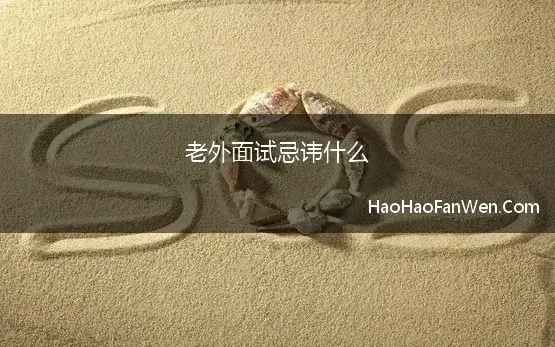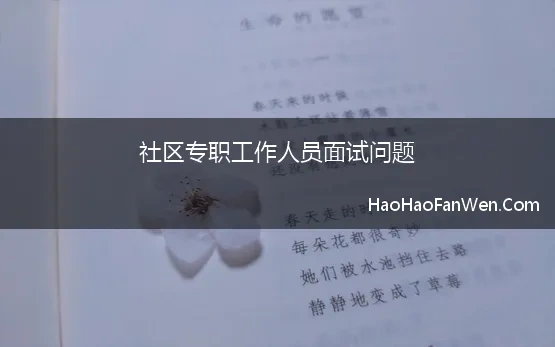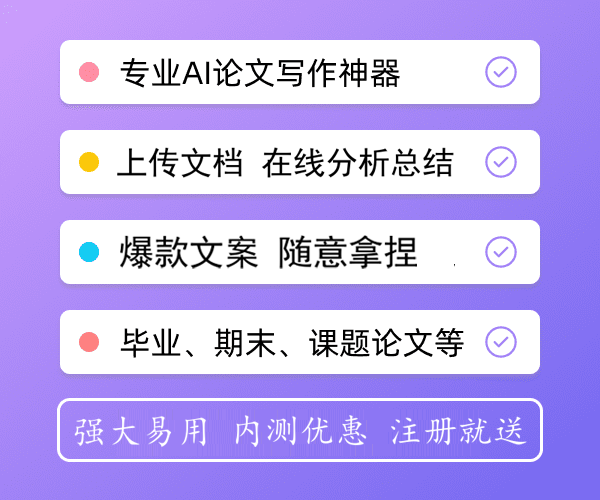老外面试忌讳什么(老外英文面试一般会问哪些问题,如何应对)
下面是好好范文网小编收集整理的老外面试忌讳什么(老外英文面试一般会问哪些问题,如何应对),仅供参考,欢迎大家阅读!

过去一年在公司内部面试5英文职位,经过10轮面试,边面试边总结,发现最后考官90%的问题我都能先预测到,恍然大悟之前那些年我们参加的面试都是有套路的。
开始说问题前,大方向说几个面试基础规则
对应聘公司和应聘职位的全方位了解极其重要,没有人会愿意招一个对公司对这个职位不了解没有热情的人,这部分的功课直接影响你下面一些问题回答的质量。了解的渠道可以来自
招聘网站的JD (job description)
招聘公司本身的网站
平常的观感
如果有人脉在这个公司想办法直接了解这个职位JD之外的信息.
认真听完问题,不要打断;回答时放慢语速,争取说清楚,不要着急;无论是面谈还是电话面试,面带微笑,别觉得电话面试不用,声音是有笑容的进而有感染力的。
无论什么问题,回答时间不要超过2分30秒。太长显得你太自我,而且2分30秒说不完的答案说明你的回答不够简练,很啰嗦
问题听不清楚大胆要求重复,不要客气。常用句型记住2个就行
Can you please repeat your question? I didn't hear your question clearly, the line was cutting off.
Sorry, can you say it again?
英文面试无非是一个人问问题,一个人回答的游戏。大部分时间问问题的是面试者Interviewer,一般到最后也会给被面者Interviewee问问题的机会。我的分析会按照这个逻辑顺序来走。
面试官的问题分3种,一般性,套路性(CBI)和专业领域性
一般性问题
一般性的问题每个面试都可能碰到,和这个职位的专业无关。常见一般性问题其实大家都大概能知道是哪些,无非是背景介绍,你为什么跳槽之类的,但是要怎么回答的好就有学问了。非常好的回答指导信息来自 Interview Questions Answered,里面不但列出问题,还列出面试官问每个问题背后的目的,建议回答的思路和参考回答。当然没有one size fits all的标准答案,只能你自己根据对自己的了解判断来写。如果写不出来,说明你英文需要迫切提高的点到了。万里长征第一步,想进外企,从这里开始。
Tell me about yourself
Your Goal: To prove to the interviewer that you have the skills and experience to be the ideal or perfect candidate for the job
Keep the answer short at about two minutes.
Focus on work-related skills and accomplishments, not personal information.
Tell the interviewer why you think your work-related skills and accomplishments would be an asset to the company.
Describe your education or work history very briefly.
Tell the interviewer about things you have done and jobs you have had related to the position you are interviewing for.
Mention one or two personal characteristics that have helped you accomplish your goals, giving short examples to illustrate.
这里很重要是简要。如何做到简要,取决于你如何针对这个公司情况和岗位要求做针对性自我介绍。你是毕业生简历相对比较简单,对我们10多年工作经验的人来说,如果你不分主次把10年的经验讲完面试官一定要睡着,一定要有取舍,只强调和新职位有关联的背景和经历。
大方向取舍好了,想说的怎么说的有逻辑也很重要,我自己总结每一段工作经历用3个部分来阐述:
所在的公司/团队
你的角色
主要成绩
Why did you leave your last job / Why are you looking for a new job
Your Goal: To minimize any problems and to show that you had positive reasons for leaving previous positions
Mention positive reasons for leaving.
Never criticize supervisors, co-workers, or the company/organization.
Don’t mention major problems with management.
Tell the interviewer about any neutral reasons for leaving.
Stay positive no matter how bad the situation you are leaving may be.
Use the right words so you don’t sound self-serving. Instead of saying “I left to seek better opportunities” say “I'm looking for a situation which will use more of my skills and experience.”
Avoid sounding like a “job hopper.”
Turn this into an opportunity to tell the interviewer about your skills and abilities, if possible.
Keep your explanation short or the interviewer may think you’re making excuses.
新人一张白纸,所以可以侧重为什么这份工作吸引你,这里继续考验你对职位的了解,想想如果你出乎考官意外说出很多这个公司方方面面深入的信息,考官会不会对你刮目相看。
对跳槽多次的老人来说,对新工作的了解之外,还很重要的是不要说过去职位不好负面的东西,比如和老板水火不容啊,哪怕这个真的是你离开的主要原因,也一定要Stay positive。面试官不会要一个满满负面情绪的人,找一些中立的原因,比如职业生涯发展,更好的发挥自己的长处等。
Why do you want to work here
Your Goal: To show that you know a lot about the company and that your qualifications match the company’s needs
Find out all you can about the company, including the department where you would work and the people you would work for.
Research the company’s products or services and the positive things it has done for the community or society.
Be familiar with the company’s mission statement and core values.
For large U.S. companies, look for information about the company through the U.S. Securities and Exchange Commission or the Better Business Bureau, in addition to the “About Us” section on the company’s own website.
Don’t make the answer all about you. Focus on the positive things about the company, including its reputation in the industry.
Tell the interviewer how your qualifications meets a need in their company.
Show the interviewer that you are being selective about where you want to work and are not willing to take just any job offered to you.
这边第四条针对了解公司信息给了更详细的指引。这里要求你说公司,少说你自己。
Where do you see yourself in five years
Your Goal: To assure the interviewer that if the company hires you, you will continue working for them, and that you have given careful thought to your future career plans.
Reassure the interviewer that you are not a “job hopper” by telling the interviewer that you plan to stay and grow with the company.
Research the company to find out the logical next positions to move up in the company.
If there is more than one direction you can move in to move up in the organization, name these paths and talk about your options depending on your future interests and performance, and the company’s needs.
Show that you are motivated and have definite plans about doing more in the company.
Avoid naming a specific job or position or you will seem too narrow or inflexible.
Do not talk about personal goals or plans.
Questions about marriage, babies, and childcare are illegal, but if you don’t plan to make any big personal life changes soon, you can volunteer that information.
背后的潜台词是希望你不是一个打一枪换一个地方心浮气躁的Job hopper。欧美企业大部分都是理解甚至鼓励你最短2年换一个岗位,在公司内部健康的流动,当然也因具体老板部分而异。但是没有人愿意看到你简历上都是1年1年半频度的跳槽,真有这样的经历相信你每次面试都会被考官针对这个问专门的问题,准备接招吧。在描述将来时也要注意这个问题,不要显得你在这个新岗位不会做很久,同时基于你对公司的理解,这个职位附近可能的发展机会也是回答这个问题的要点。
What are your strengths
Your Goal: To show how your strengths match the needs of the job
Know your strengths in three categories:
Knowledge-based skills – These are skills developed through education and experience, such as computer skills, university degrees, languages you speak, and technical ability.
Transferable Skills – These are skills that you can take from one job to another, such as being able to manage people well, being good at solving complex problems, being good at planning, and being a good communicator.
Personal Traits – These are qualities about you are a person, such as being dependable, being hard working, being flexible, and being outgoing.
Review with the interviewer your strengths, which are already noted in your resume and cover letter.
Give specific evidence or examples of how your strengths have helped you in the past.
准备的时候可以分3类,这样回答起来显得有条理有内容。还有一定要注意举具体例子来支撑,不要总是大话空话。
What are your weaknesses
Your Goal: To name weaknesses that can be improved on and that may be an asset in the right circumstances
Don’t try to present a strength as a weakness, such as being a workaholic or being too detail-oriented.
Keep the weakness a small one.
Show how you are working to improve on your weakness.
Give specific evidence or examples of how you’re working to overcome your weakness. Some options:
Tell the interviewer about a weakness you have already overcome.
Tell the interviewer about a mistake you made in the past to show that you can learn from your mistakes.
Tell the interviewer about a weakness that does not relate to the duties of this job.
看到第一点很多人笑了,包括我。太贱了,确实有人把经常加班当短处来说,是笑呢还是笑呢。具体诚恳的指出自己的弱点,而且这里发挥演讲能力的时候到了,可以通过将弱点及如何克服弱点反过来可以体现你Self-awareness和Self-motivating的能力。
同时避免这个弱点和要应聘的工作关联紧密,比如面试项目经理的岗位就不要老是提自己没有时间观念等。
专业性的问题这里就很难总结了,行业不同道行深浅,问的问题给的答案都大有不同。对从事行业领域词汇的准备肯定是必不可少,再来就是临场针对问题如何回答的有条理,有内容也是需要常年锻炼积累,可以看我马上要完成的另一篇帖子“如何提高口语表达能力”。
套路性(CBI)问题。
面试是非常主观的事情,有点像相亲,一锤子买卖,当场看的顺眼下午就领证10天后离婚的大有人在。外企还更麻烦,请神容易送神难,各种HR政策保护,招进来没那么容易裁掉。我同事就私下分享过他前老板某次酒后吐真言吐槽底下一个人没看好招进来后怎么忍受一颗老鼠屎带来的折磨,简直是痛哭流涕啊,一个老板。。想想也心酸。痛定思痛,所以怎么在招人时更科学系统全方面对应聘者进行评估,国外企业搭建了一套基于能力评估应聘者的面试模型。这里不得不佩服西方企业在搭建系统流程和体系方面的能力,通过规范化,很多事情不管谁来做效果都一样,主观成分当然也有,但是被削弱了不少。针对从来没参与过招聘的新晋面试官,也提供了很好的指导。
CBI全名 Competency-based interview,基于能力考核的面试。
常见的Competency有:
Adaptable: 考核适应力,面对新挑战的反应能力
Customer First: 客户优先,顾名思义总是把客户当上帝的能力
Decide (Judge): 做决定的能力
Drive: 驱动自己,他人或者团队达到预定目标的能力
Engage others: Engage好难翻译成中文,意思大概是强力搞定他人及团队的能力,能和其他人和团队紧密耦合为目标服务。这个地方和Drive还是有不同,我自己也需要进一步消化。
Inclusive: 包容力。很好理解,外企很尊重多样性,包容不同背景不同性格不同年龄各种不同是很重要的一种能力。
Innovate: 创新能力
Intellectual capacity: 智商
Personal effectiveness: 个人效率,自我发展的能力。
我见过的大概就是这些,不同公司应该会有变化,但是逃不出这个框框。
针对每一个Competency,会有一些典型的问题,以及面试者不同回答对应的打分。
比如针对Adaptable举个栗子:
Question: 能否和我分享下某一次你负责一个大项目的时候,项目碰到一个很大的问题,你怎么反应的,最后的结果是什么。
Answer:
可能的回答1:有人可能因为没准备或者慌张,说我做过的项目因为祖上积德,都很成功,没有栗子。那么也是可以,然鹅你觉得效果好吗?差评
可能的回答2:真实说出一个项目碰到的问题,怎么反应解决的。这里怎么说让人容易听得懂,怎么说才能拿到高分就是学问了。继续
怎么说:引出CAR或者STAR模型来描述
CAR: Context Action Result。STAR把ST换成 Situation Tasks也差不多
Context/Situation: 描述这个案例整体的背景。你原来来自的领域有可能和面试官不同,这里就需要介绍清楚背景,才能让你后面的A和R有办法被人理解。
Tasks: 你的任务是什么
Action:你做了什么
Result: 导致什么结果
拿到刚才这个问题,模板式的CAR可以是
Context: 我去年参与了一个公司供应链方面全球的项目,这个项目从美国发起,美国人其实对中国国情不了解,想当然认为美国能用的模型放到中国一定能用。在需求定义阶段大家争议很多,相持不下
Action:做大量的数据调研和数据分析科学证明美国的模型不适用,或者需要做一些定制化才可以
Result:美国人妥协,项目内容深度针对中国定制。最终项目成功完成并且效果良好
这个答案好吗?这里看出了你什么呢?此处静默两分钟想想:
这个人沟通能力还不错,能够在美国人的压力下想办法沟通并解决问题
这个人决定能力还不错,有一定数据采集能力
我们来看看标准评估
好:面对困境能始终如一的表现出韧劲和灵活性,能快速找到方案解决问题,当一个方案不适用时尝试多种方案
中:表现出一定的韧劲和灵活性
差:表现出很少的韧劲和灵活性,从困难中缓慢恢复,当一个方案不行时直接放弃
前面那个模板答案最少有中,甚至好的评分。针对不同的Competency排列组合,会有多个这样的问题问出来,比如半小时的面试,可能会有5-6个这样的问题,每一个给出打分,总分再加权平均之类的,就会是你面试在CBI方面的总分。这个根据职位要求不同问题的选择会不同。
不变应万变的是准备10个或者以上的CAR/STAR,预先组织好语言,问到不同问题的时候可以往上套。
专业领域类的问题
这个就很难总结了,针对你职业领域的不同差别会很大。举个栗子,比如你面试万金油项目经理PM的职位,简历里也写了拿过PMP证书,可能就会被问到项目一般分成哪些阶段啊,什么是瀑布模型,瀑布和敏捷有什么区别等等的专业性问题。
面试者的问题
按套路,外企一定会给你问问题的时间和机会。别犯傻客气说No, thank you,那么你已经代替面试官对自己说No了。有时候确实问很弱智问题比不问问题好,但是有所准备提出有质量的问题,能表现出你对公司的了解,是否积极主动,是否有想法。
比如可以说我在公司网站各大社交媒体私人关系各方面尽力对公司和这个职位有了了解了,但是某个地方还不是很清楚,您能否对公司职位在这个地方进一步说明下blabla。很贱对不对,在问问题前其实已经有意暴露我对这个面试很用心,花了时间准备,有热情,积极主动。。此处赞美省略三百字,其实考官回答什么不重要,你的目的已经达到。
我经常用的套路问题是 What is the top quality this candidate needs to have in order to become a best performer on this new position。这个什么职位都能问,问题也不算俗,不同的面试不同考官的回答也经常很有趣,确实也是面试你的收获之一。
套路问题之外,如果你不紧张,英文游刃有余,通过前面回答考官的问题你可能也能积累一两个临场问题,也非常好。问这样的问题体现出你对面试的重视,全神贯注,英语听力好,所有Points都能get到等等。
有什么问题可以留言交流。
看得好给新人点个赞鼓励下哈。






